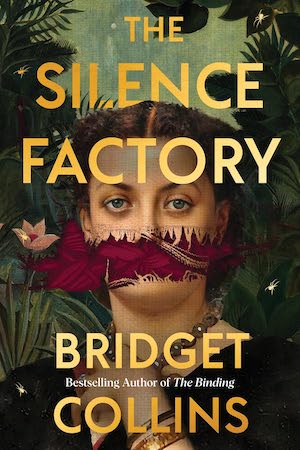There is always gratifying schadenfreude in a well-told postcolonial parable, and I love the jaunty, measured confidence of a neat, polished story about naive 19th century English people about to do regretful things with all the self-awareness of a boiled potato. More often than not, when we first meet these characters, the sun is shining down on them, and the world is bright and beautiful and kind, and they have no clue of the hurricane of slow, creeping misery about to happen to them over the next 200-odd pages.
The Silence Factory by Bridget Collins is one of these novels, and I devoured it like a hungry orphan in two days. It has, on the outset, all the right ingredients for period-drama messiness: an orangery, a terrible marriage, a guileless himbo, a screwed-up town, and all the arrogance and condescension that white civilized Britannia can spare toward the unknown. There are strange spiders, bad family legacies, and all the right period-appropriate lashings of tired resentment, nauseating sexism, and drawn-out homoeroticism one could hope for. Collins (perhaps augmented by her training as an actor) has a real gift for theatrical charm and pacing that shines through on the page. The Silence Factory is a meticulously-planned tour through twin narratives of colonial sins and can-do English entrepreneurialism (which goes hand-in-hand with wretched English hubris), led by a lively (at times, gleefully unforgiving) conductor with the timing and precision of a surgeon.
Things aren’t perfect for Henry Latimer, recently widowed and working a dead-end job for his father-in-law who makes intricate hearing aids. After meeting the wealthy, eccentric owner of a little-known spider silk factory, Henry’s future starts to feel bright and rosy, and on his journey Collins mercilessly imbues him with an intoxicating strain of ambition that constantly feels on the verge of disaster. Originally trained as a poet, Henry is finally given the opportunity to indulge in his penchant for romanticism and sentimentality; what his new employer-benefactor gives him isn’t just independence from grief and mundanity, but a passionate new cause. The language here has fantastic sense of momentum drawn from Henry’s swelling pride, small tastes of success, approval and acceptance—things Collins deeply understands are integral to building a sense of giddy, impossible hope, which, in turn, necessitates a brutally sober return to the reality of living in such a debilitatingly divided society.
Buy the Book


The Silence Factory
We only know the other protagonist, Sophia Ashmore, through her old journal from the 1820s; Sophia’s husband, James, dragged her to a remote Greek island in search of a rare spider meant to have fantastical properties. Again, Collins leans on the sensibilities of tightly-laced upper class tradition and English cultural solipsism to contextualize Sophia, who struggles to support James in his Very Important Work. At times these characters (quite necessarily) veer into heady caricature—Sophia as a repressed, dutiful wife, and James as a sweaty, amazingly unhinged villain. Collins here indulges a bit with Sophia’s voice—often exuberant, anguished, desperate in the privacy of her diary entries—to craft a moody, borderline maudlin portrait of an Englishwoman who almost escaped the bonds of Englishness.
Together, Henry and Sophia make an exceedingly well-structured, extremely readable train wreck—really, two parallel train wrecks practically vibrating off their respective tracks—that hinges on each protagonist’s inherent drive toward qualities like determination and goodness and perseverance. In the context of the English identity at the time, so consumed with duty and maintenance and anglochristian-dictated hierarchy. Is it not English to want to be all these things? Don’t these principles distinguish the English from the inscrutable pagans on that cursed Greek island? Sophia’s enchantment and enthrallment with this prospective other life—a life of social and sexual liberation away from James—isn’t a new exploration of a new phenomenon by any means. What Collins shines at here is embodying the babbling rationalization and re-rationalization of a sheltered woman finally reckoning with the smallness of her designated place in the world: turbulent and rife with emotion and regression.
Henry, also trapped within the confines of his proper station, has a lot going on. But he is my favorite, and the real neurotic icon in the story, because Collins has molded him from all the familiar failures and base thoughts and innocuous greedy little ideas that have been part of society forever. And when it’s much too late—when Henry finally realizes with glacial denseness that he has made some incredibly bad decisions—all of that giddy joy and excitement that he’s been coasting on suddenly melts away to leave behind the cold, sharp edges of reality. Whomst among us hasn’t been there, and whomst among us doesn’t take some delight from seeing all of this unfold for a character so clearly careening toward the private hell of public humiliation?
Collins may not have set out with moral instruction in mind, but at the end of the book, there’s nevertheless that familiar urge to gently pat Henry on the shoulder and tell him, ah, dear man, it was all a hard lesson learned. Naturally, these elements of regret, remorse, recompense, and shame have much wider meaning for modern reader—at least one who chooses to dig into the absolute shitshow of postcolonial literary analyses and metaphors and subtext connected to this genre. But for Henry, painfully humbled and unable to undo his sins, and for Sophia, living in service of a tyrannical buffoon, their failures aren’t meta-self-owns—they’re deep, personal blemishes that one must find a dignified way to live with. This is the famous stiff upper lip that colonial thinking is built on, which continues to define mainstream English culture today, and is an especially fine lens through which to pore over The Silence Factory while curled up with a cup of tea. Is that not the English way?
The Silence Factory is published by William Morrow.

